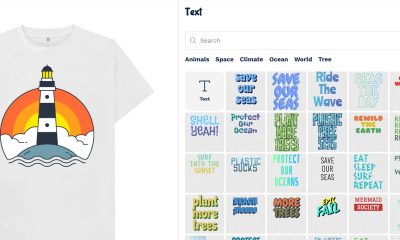Gardening & Landscaping
Grow Your Garden with the Right Fertilizer: Here’s How!
Gardening is an incredibly rewarding experience, and with the right fertilizer, you can take your garden to the next level! Whether you’re a beginner or a seasoned pro, you can easily find the fertilizer that’s right for you. Invest in your garden today and watch it flourish!
Published
1 year agoon

Are you looking for a way to make your garden grow lush and beautiful? Do you want to make sure that your plants are getting the nutrients they need to thrive? If so, then you need to learn how to use the right fertilizer for your garden! With the right fertilizer, you can ensure that your garden is getting the nutrients it needs to grow strong and healthy. Here’s how to choose the right fertilizer for your garden and make sure your plants get the nutrients they need to flourish!
Why Fertilizer is Essential for Growing a Healthy Garden
Fertilizer is essential for growing a healthy garden. Without it, plants would not be able to get the nutrients they need to grow and thrive. Fertilizer helps to replenish the soil with the essential nutrients that plants need to grow and produce healthy, abundant fruits and vegetables.
Fertilizer helps to improve the soil structure, allowing for better water and air circulation. This helps to keep the soil from becoming compacted and prevents water from pooling and becoming stagnant. The improved soil structure also helps to reduce the risk of soil erosion, which can be damaging to a garden.
Fertilizer also helps to improve the soil’s nutrient content. Plants need certain nutrients to grow and produce healthy fruits and vegetables. Without these nutrients, plants will not be able to reach their full potential. Fertilizer helps to provide these essential nutrients, allowing plants to reach their full potential.
Fertilizer also helps to improve the soil’s pH level. A healthy soil pH level is essential for plants to absorb the nutrients they need. If the soil is too acidic or too alkaline, plants will not be able to absorb the nutrients they need. Fertilizer helps to balance the soil’s pH level, allowing plants to absorb the nutrients they need.
Fertilizer also helps to reduce the risk of disease and pests. Fertilizer helps to create a healthy environment for plants, which reduces the risk of disease and pests. Healthy plants are less likely to be affected by disease and pests, allowing them to reach their full potential.
Fertilizer is essential for growing a healthy garden. Without it, plants would not be able to get the nutrients they need to grow and produce healthy, abundant fruits and vegetables. Fertilizer helps to improve the soil structure, nutrient content, and pH level, allowing plants to reach their full potential. Fertilizer also helps to reduce the risk of disease and pests, allowing plants to remain healthy and productive. For these reasons, fertilizer is essential for growing a healthy garden.
The Benefits of Using the Right Fertilizer for Your Garden
If you’re serious about having a beautiful, healthy garden, then you need to make sure you’re using the right fertilizer. Fertilizer is the key to unlocking the full potential of your garden, providing essential nutrients to your plants that will help them thrive.
The benefits of using the right fertilizer for your garden are numerous. First, it will help your plants grow stronger and healthier. With the right fertilizer, your plants will be able to absorb more nutrients from the soil, allowing them to grow faster and more vigorously. This means that you’ll be able to enjoy a lush, vibrant garden in no time.
Second, fertilizer will help your plants resist disease and pests. When your plants are healthy and strong, they’re better able to fight off any potential threats. This means that you won’t have to worry about your garden being overrun by pests or succumbing to a disease.
Third, fertilizer will help your plants produce more fruit and flowers. With the right fertilizer, your plants will be able to produce more flowers and fruits, giving you a bountiful harvest. This means that you’ll be able to enjoy the fruits of your labor for longer.
Finally, fertilizer will help your plants to be more drought-resistant. When your plants are well-nourished, they’ll be better able to withstand periods of drought. This means that you won’t have to worry about your garden wilting in the heat of summer.
Using the right fertilizer for your garden is essential if you want to get the most out of your plants. With the right fertilizer, you’ll be able to enjoy a lush, vibrant garden that is full of life and beauty. So don’t skimp on the fertilizer – invest in the right one and reap the rewards of a healthy, thriving garden.
How to Choose the Best Fertilizer for Your Garden
When it comes to growing a lush, healthy garden, the right fertilizer can make all the difference. But with so many options on the market, it can be difficult to know which fertilizer is best for your garden.
The key to choosing the best fertilizer for your garden is to understand the different types of fertilizer and their specific benefits. The three main types of fertilizer are organic, synthetic, and slow-release. Organic fertilizers are derived from natural sources such as compost, manure, and seaweed. They provide a range of essential nutrients to the soil and are generally considered the most environmentally friendly option. Synthetic fertilizers are manufactured in a lab and are often used to supplement organic fertilizers. They provide a quick boost of nutrients to the soil, but can be harmful to the environment if used in excess. Finally, slow-release fertilizers are designed to release nutrients gradually over time, providing a steady supply of nutrients to the soil.
When choosing the best fertilizer for your garden, it’s important to consider the type of plants you’re growing. Different plants require different nutrients, so you’ll need to choose a fertilizer that provides the right balance of nutrients for your specific plants. It’s also important to consider the soil type in your garden. Different soil types require different fertilizers, so you’ll need to choose a fertilizer that’s specifically designed for your soil type.
Finally, it’s important to consider the cost of the fertilizer. Organic fertilizers tend to be more expensive than synthetic fertilizers, but they are generally considered to be the best option for the environment. Synthetic fertilizers are often cheaper, but they can be harmful to the environment if used in excess. Slow-release fertilizers are generally the most expensive option, but they provide a steady supply of nutrients to the soil over time.
Choosing the best fertilizer for your garden can be a daunting task, but it doesn’t have to be. By understanding the different types of fertilizer and their specific benefits, you can make an informed decision that will help ensure your garden is lush and healthy.
Tips for Applying Fertilizer to Maximize Growth
Fertilizer is an essential part of any garden, and applying it correctly can make a huge difference in the growth and health of your plants. Here are some tips for applying fertilizer to maximize growth and ensure your plants are getting the nutrients they need.
First, it’s important to understand the type of fertilizer you’re using. Different fertilizers have different nutrient levels, so make sure you’re using the right one for your plants. If you’re not sure, consult a gardening expert or do some research online.
Second, you need to make sure you’re applying the fertilizer correctly. Over-fertilizing can be just as bad as under-fertilizing, so make sure you’re following the instructions on the package. If you’re not sure, err on the side of caution and use less fertilizer than recommended.
Third, you need to make sure you’re applying the fertilizer at the right time. Different plants have different nutrient needs, so make sure you’re applying the fertilizer when it’s most beneficial for the plants. Generally, it’s best to apply fertilizer in the spring and fall, when the plants are actively growing.
Fourth, you need to make sure you’re applying the fertilizer evenly. If you’re using a spreader, make sure you’re using it correctly and that you’re spreading the fertilizer evenly. If you’re applying it by hand, make sure you’re distributing it evenly over the entire area.
Finally, you need to make sure you’re using the right amount of fertilizer. Too much fertilizer can burn your plants, so make sure you’re following the instructions on the package. If you’re not sure, it’s best to err on the side of caution and use less fertilizer than recommended.
By following these tips, you can ensure that you’re applying fertilizer correctly and maximizing growth in your garden. Fertilizer is an essential part of any garden, and by applying it correctly, you can ensure that your plants are getting the nutrients they need to thrive.
The Advantages of Using Organic Fertilizers for Your Garden
Organic fertilizers are a great choice for gardeners who want to keep their gardens healthy and thriving. Organic fertilizers are made from natural materials, such as compost, manure, and plant materials, and they are free of synthetic chemicals. They are not only beneficial for your garden, but they are also better for the environment. Here are some of the advantages of using organic fertilizers for your garden.
Organic fertilizers are much safer for the environment than synthetic fertilizers. Synthetic fertilizers are made from chemicals that can be toxic to the environment, while organic fertilizers are made from natural materials that are not harmful. Organic fertilizers also help to reduce soil erosion, since they are slow-release and don’t wash away as quickly as synthetic fertilizers.
Organic fertilizers are also much better for your plants. Synthetic fertilizers can burn plants if they are applied too heavily, while organic fertilizers are much gentler. Organic fertilizers also provide a more balanced nutrition for your plants, since they contain a variety of essential nutrients.
Organic fertilizers are also more cost-effective than synthetic fertilizers. Synthetic fertilizers can be expensive, while organic fertilizers are usually much cheaper. You can also make your own organic fertilizer at home with materials like compost and manure, which can save you even more money.
Organic fertilizers are also better for the soil. Synthetic fertilizers can deplete the soil of essential nutrients, while organic fertilizers help to replenish the soil and promote healthy soil structure. Organic fertilizers also help to improve the soil’s ability to retain water, which can help to reduce the need for irrigation.
Finally, organic fertilizers are better for your health. Synthetic fertilizers can contain toxins that can be harmful to your health, while organic fertilizers are free of these toxins. Organic fertilizers also help to reduce the risk of plant diseases, since they contain beneficial microorganisms that can help to keep your plants healthy.
Overall, organic fertilizers are a great choice for gardeners who want to keep their gardens healthy and thriving. They are safer for the environment, better for your plants, more cost-effective, better for the soil, and better for your health. So if you’re looking for a way to keep your garden healthy and productive, consider using organic fertilizers.
![]()
You may like
-


Review for the Organic Cotton Beach Tote Bag on Beachesandsea.com
-


From Beach Bum to City Chic: The Tote Bag’s Triumphant Return as a Summer Staple
-


Beaches & Sea: A Beachgoer’s Dream Come True
-


Discover the Secret Weapon Every Beachgoer is Talking About: The ‘No’ Collection!
-


The Easiest Way to Create Personalized Items: A Review of Beaches and Sea’s Design Studio
-


Exclusive £5 Accessory Alert: Unveiling the Essential GA200 Underwater Housing – We found it!
